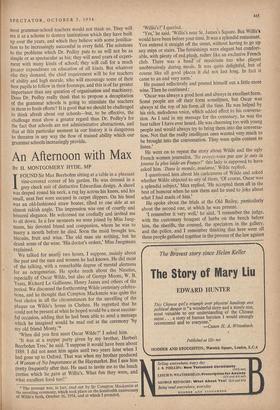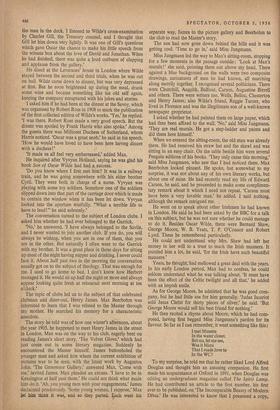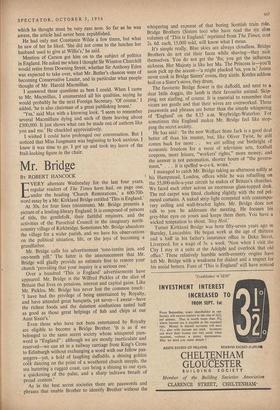An Afternoon with Max
BY H. MONTGOMERY HYDE. MP IFOUND Sir Max Beerbohm sitting at a table in a pleasant vine-covered corner of his garden. He was dressed in a grey check suit of distinctive Edwardian design. A shawl was draped round his neck, a rug lay acrosslis knees, and his small, neat feet were 'encased in carpet slippers. On his head was an old-fashioned straw boater, tilted to one side at an almost rakisii angle. The impression was one of courtly and leisured elegance. He welcomed me cordially and invited me to sit down. In a few moments we were joined by. Miss Jung- mann, his devoted friend and companion, whom he was to marry a month before he died. Soon the maid brought tea, biscuits, fruit and wine. The old man ate nothing, but he drank some of the wine. 'His doctor's orders,' Miss Jungmann explained. We talked for nearly two hours. I suppose, mainly about the past and the men and women he had known. He did most of the talking, with a remarkable degree of mental alertness for an octogenarian. He spoke much about the Nineties, especially of Oscar Wilde, but also of George Moore, W. B. Yeats, Richard Le Gallienne, Henry James and others of the period. We discussed the forthcoming Wilde centenary celebra- tions, and he thought that Compton Mackenzie was quite the best choice in all the circumstances for the unveiling of the plaque on Wilde's house in Chelsea. He regretted that he could not be present at what he hoped would be a most success- ful occasion, adding that he had been able to send a message which he imagined would be read out at the ceremony `by my old friend Monty.'* `When did you first meet Oscar Wilde?' I asked him. `It was at a supper party given by my brother, Herbeit Beerbohm Tree,' he said. 'I suppose it would have been about 1889. I did not meet him again until two years later when I had gone up to Oxford. That was when my brother produced A Woman of No Importance at the Haymarket. But I saw him pretty frequently after that. He used to invite me to the lunch parties which he,gave at Willis's. What fun they were, and what excellent food too !'
'' The message was, in fact, read out by Sir Compton Mackenzie at the unveiling ceremony, which took place on the hundredth anniversary of Wilde's birth, October 16, 1954, and at which I presided.
'Willis's?! 1 queried. `Yes,' he said. `Willis's near St. James's Square. But Willis's would have been before your time. It was a splendid restaurant.
You entered it straight off the street, without having to go up any steps or stairs. The furnishings were elegant but comfort- able, with plenty of red plush, rather like an exclusive French club. There was a band of musicians too who played unobtrusively during meals.' It was quite delightful, but of course like all good places it did not last long. In fact it came to an end very soon.
He paused reflectively and poured himself out a little more wine. Then he continued : , `Oscar was always a good host and always in excellentform. Some people are off their form sometimes, but Oscar was always at the top of his form all the time. He was helped by his rich, melodious voice, which added effect to his conversa- tion. As I said in my message for the centenary, he was the best talker I have ever heard. He was charming too with young people and would always try to bring them into the conversa- tion. Not that the really intelligent ones wanted very much to be brought into the conversation. They were quite content to listen.'
He went on to repeat the story about Wilde and the ugly French woman journalist. 'Ne croyez-vous pas que je suis la femme la plus hide en France?' this lady is supposed to have asked him. 'Dans le monde, madame,' Wilde replied.
I questioned him about his caricatures of Wilde and asked whether Wilde objected to any of them. 'Of course, Oscar was a splendid subject,' Max replied. 'He accepted them all in the best of humour when he saw them and he used to joke about what I had made of him.'
He spoke about the trials at the Old Bailey, particularly about the second one, at which he was present.
'I remember it very well,' he said. 'I remember the judge. with the customary bouquet of herbs on the bench before him, the sheriffs, the counsel, the spectators in the gallery. and the police, and I remember thinking that hero were all these people gathered together in the process of the law against the man in the dock. I listened to Wilde's cross-examination by Charles Gill, the Treasury counsel, and I thought that Gill let him down very lightly. It was one of Gill's questions which gave Oscar the chance to make his little speech from the witness box about the love of David and Jonathan. When he had finished, there was quite a loud outburst of clapping and applause from the gallery.'
He dined at the Leversons' house in London where Wilde stayed between the second and third trials, when he was out on bail. Wilde came down to dinner, but was very depressed at first. But he soon brightened up during the meal, drank some wine and became something like his old self again, keeping the company enraptured with his jokes and stories.
1 asked him if he had been at the dinner at the Savoy, which was organised by Robert Ross in 1908 to mark the publication of the first collected edition of Wilde's works. 'Yes,' he replied. `I was there. Robert Ross made a very good speech. But the dinner was spoiled by Frank Harris who also spoke.' Among the guests there was Millicent Duchess of Sutherland, whom Harris noticed. 'Oscar was a great snob,' he said in his speech. `How he would have loved to have been here having dinner with a duchess!'
`It made us all feel very embarrassed,' added Max.
He inquired after Vyvyan Holland, saying he was glad his book Son of Oscar Wilde had had a success.
`Do you know where I first met him? It was in a railway train, and he was going somewhere with his elder brother Cyril. They were both in charge of a nurse. Vyvyan was playing with some toy soldiers. Somehow one of the soldiers slipped down into that part of the carriage door which is made to contain the window when it has been let down. Vyvyan looked into the aperture wistfully. "What a terrible life to have to lead!" he said solemnly.'
The conversation turned to the subject of London clubs. I asked him whether he had ever belonged to the Garrick.
`No,' he answered. 'I have always belonged to the Savile, and I never wanted to join another club. If you do, you will always be wishing, when you are in one of them, that you are in the other. But naturally I often went to the Garrick with my brother. It was a great place in those days for sitting up most of the night having supper and drinking. I never could face it. About half past two in the morning the conversation usually got on to the subject of theology. That was enough for me. I used to go home to bed. I don't know how Herbert managed it. He would sit up half the night or more and always appear looking quite fresh at rehearsal next morning at ten o'clock.'
The topic of clubs led us to the subject of that celebrated clubman and diner-out, Henry James. Max Beerbohm was interested to learn that I was related to the Master through my mother. He searched his memory for a characteristic anecdote.
The story he told was of how one winter's afternoon, about the year 1905, he happened to meet Henry James in the street in London. Max was on the way to his club, eagerly bent on reading James's short story, 'The Velvet Glove,' which had just come out in some literary magazine. Suddenly he encountered the Master himself. James buttonholed the younger man and asked him where the current exhibition of pictures was to be seen, with the latest work by Augustus John. 'The Grosvenor Gallery,' answered Max. 'Come with me,' invited James. Max pleaded an excuse. 'I have to be in Kensington at half past three.' He could not think what made him do it. 'Alt, you young men with your engagements,' James declaimed ponderously. 'Some young woman, I suppose,' Max let him think it was, and so they parted. 4ach went his separate way, James to the picture gallery and Beerbohm to the club to read the Master's story.
The sun had now gone down behind the hills and it was getting cool. 'Time to go in,'. said Miss Jungmann.
Miss Jungmann led the way to Max's sitting-room, stopping for a few moments in the passage outside : 'Look at Max's murals!' she said, pointing them out above my head. There against a blue background on the walls were two composite drawings, caricatures of men he had known, all marching along merrily together. I recognised several politicians. There were Churchill, Asquith, Balfour, Carson, Augustine Birrell and others. There were writers too, Wells, Belloc, Chesterton and Henry James; also Wilde's friend, Reggie Turner, who lived in Florence and was the illegitimate son of a well-known newspaper proprietor.
I asked whether he had painted them on large paper, which had then been affixed to the wall. `No,' said Miss Jungmann. `They are real murals. He got a step-ladder and paints and did them here himself.'
When we entered the sitting-room, the old man was already there. He had removed his straw hat and the shawl and was sitting in an easy chair. On the table beside him were several Penguin editions of his books. 'They only came this morning,' said Miss Jungmann, who saw that I had noticed them. Max Beerbohm looked pleased. He spoke, but somewhat to my surprise, it was not about any of his own literary works. but about one of mine. He had recently read my life of Edward Carson, he said, and he proceeded to make some complimen- tary remark about it which I need not repeat. 'Carson must have been a very lovable man,' he added. I said nothing, although the remark intrigued me.
He went on to speak about other Irishmen he had known in London. He said he had been asked by the BBC for a talk on this subject, but he was not sure whether he could manage to do it. Besides Oscar Wilde, there were Bernard Shaw, George Moore, W. B. Yeats, T. P. O'Connor and Robert Lynd. These he remembered particularly.
He could not understand why Mrs. Shaw had left her money in her will to a trust to teach the Irish manners. It puzzled him a lot, he said, 'for the Irish have such beautiful manners.'
Yeats, he thought, had mellowed a great deal with the years. In his early London period, Max had to confess, he could seldom understand what he was talking about. 'It must have been the effect of the Celtic twilight and all that,' he added with an impish smile..
As for George Moore, he admitted that he was good com- pany, but he had little use for him generally. 'Judas Iscariot sold Jesus Christ for thirty pieces of silver,' he said. 'But George Moore would sell his best friend for nothing.'
He then recited a rhyme about Moore, which he had com- posed, having first begged Miss Jungmann's pardon for its flavour. So far as I can remember, it went something like this: I met Musette In the water closet. But no, let me see, Was it Mimi That I made love to In the WC?
To my surprise, he told me that he rather liked Lord Alfred Douglas and thought him an amusing companion. He first made his acquaintance at Oxford in 1891, when Douglas was editing an undergraduate magazine called The Spirit Lamp. He had contributed an article to the first number, his first ever to be published, on 'The Incomparable Beauty of Modern Dfess.' He was interested to know that I possessed a copy. which he thought must be very rare now. So far as he was aware, the article had never been republished.
He had only met Constance Wilde a few times. but what he saw of her he liked. 'She did not come to the lunches her husband used to give at Willis's,' he said.
Mention of Carson got him on to the subject of politics in England. He asked me when I thought Sir Winston. Churchill would retire from Downing Street, whether Sir Anthony Eden was expected to take over, what Mr. Butler's chances were of becoming Conservative Leader, and in particular what people thought of Mr. Harold Macmillan.
I answered these questions as best I could. When I came to Mr. Macmillan, 1 enumerated all his qualities, saying he would probably be the next Foreign Secretary. 'Of course.' I added, 'he is also chairman of a great publishing house.'
`Yes,' said Max with a knowing look. 'I seem to remember several Macmillans dying and each of them leaving about £300,000. It just shows what can be made out of authors like you and me.' He chuckled appreciatively.
I wished I could have prolonged our conversation. But I noticed that Miss Jungmann was beginning to look anxious. I knew it was time to go. I got up and took my leave of the frail-looking figure in the chair.




















































 Previous page
Previous page